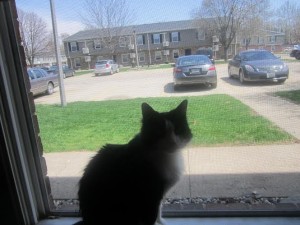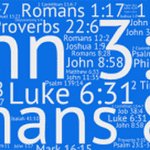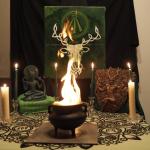Janet Callahan is a Pagan author, lecturer, and workshop leader. She’s published many articles and posts across the internet. She has an essay in the book Manifesting Prosperity: A Wealth Magic Anthology published by Immanion Press, and edited by Taylor Ellwood. She currently writes two blogs: janetcallahan.com and Our Little Acorn: A Pagan mama with a medically fragile kid, just trying to figure out how to make it one day at a time. ourlittleacorn.blogspot.com/
Masery: How did you discover Paganism in college? Why did you decide to embrace that path?
Janet: I was the kid causing trouble in Sunday School as early as kindergarten. “If you believe Jesus rose from the dead this morning, raise your hand!” was the statement our Sunday School teacher asked one Easter Sunday. I was the only kid who didn’t, and when questioned, I said, “but that was a million years ago, not today.” My teacher was horrified – to this day, I’m surprised that it never got back to my parents.
Needless to say, it didn’t get better as I got older. I went through confirmation class because my father insisted, not because I actually wanted to, and had a lot of issues with the things I was being taught. We lived in a very small, rural town, where almost everyone was of German immigrant heritage, and almost everyone was Catholic or Lutheran – there was no way of learning about any other options at that time, so I just tried to work it out for myself, figuring that somehow I’d either be given faith, or I wouldn’t.
I’d read everything our public library had on ghosts and ESP (and just about every other subject available, frankly). I’d taught myself to meditate. I’d studied Greek mythology in school, and was fascinated by this idea that there could be more than one God, but it never occurred to me that there might still be people who believed that. I had seen ghosts and other spirits in a few places, and there was no place for that in the religion of my family, so I really didn’t know what to do.
In a lot of ways, college was a relief – so many more options, so many more people, and even that was at a relatively small school. When I left for college, I was engaged to a guy I’d known since early childhood, and about a year and a half later, he broke things off. His friends stopped talking to me, and so I eventually made new friends…some of whom were Pagan, and most of whom were interested in things my ex did not approve of – role playing, playing cards at all hours of the night. A real group of geeks among geeks (I went to a small engineering school). As we got to talking about various things, I realized that there were other options out there, religion wise, if I wanted to look.
It took me a long time to finally step away from the church – there was this underlying feeling that I might be wrong, that I might be deluding myself…but the experience of ritual was hard to deny. It was the first time in years that I felt a connection to the divine. It was the first place where my experiences were accepted rather than me being told I was imagining things. I may be imaginative….but I know the difference between what’s real and what’s in my head. And for the most part, I found
people who were less judgmental and more focused on doing the right thing, even when it wasn’t popular.
Masery: Part of your practice includes techno-Paganism and pop-culture magick. How do you describe those practices?
Janet: Largely, it’s an issue of working with whatever energy is available – not just the old Gods and spirits, but new ones too. For several years, we ran a small business that depended greatly on our computer equipment and printers being functional, and that was the beginning of seeking out those newer energies. I’ve helped write fairy rituals around Tinkerbell. And have done some work with other icons of modern culture who aren’t Gods per se, but who have enough of a popular following to have their own energy. I’ve worked with more modern deities too – Gods and Goddesses of this
place, rather than those tied to older cultures.
Masery: When and how did you meet your husband, Barry?
Janet: He was a part of the group of friends I met in college. We’ve been together for 15 years this spring.

IMAGE: May pole with intricately multicolored metallic ribbons. Posted to Flickr by seattlejitterbalm. Attribution-NonCommercial-ShareAlike 2.0 Generic license
Masery: When I was about twenty-two years old, my OBGYN suggested I get tested for genetic issues since my periods were irregular and often nonexistent. I remember sitting in the geneticists office with my husband. Two specialists on one side of a big desk where a box of tissue was all ready on the edge near me. Right then, I knew the news wasn’t going to be good. When they told me I had Turners Mosaic and had most likely lost any ova I may have had during my first menstruation at puberty. I was infertile. I felt crushed and swept away into a deep depression. I mourned the loss of possibilities: harboring life and sharing a different kind of connection with my husband, raising a child of my own blood. What made getting pregnant so difficult for you and what was your experience hearing the diagnosis for the first time?
Janet: Honestly, I’m fascinated that you had a doctor who actually wanted to figure out what was going on, rather than just telling you to go take some pills.
While I was one of the first girls in my age group to start menstruating at age 10, by 12 my periods were often 3-4 months apart, and I think I only had one or two periods in the entire time I was in high school.
I went to the OBGYN for the first time just before I left for college. He’d told my mother that not having regular periods was “ok” until I got to be 18. So, before I went off to college, I was sent to see the doctor. He was far more concerned about the fact that I was an 18 year old virgin than about my lack of periods – “oh, we’ll just put you on the pill, since you’re having sex anyway…what do you mean you’re not sexually active? Seriously? Well, you know, it’s ok to have sex….” Never mind that I was dating someone seriously (the ex mentioned above), and we’d talked about it, and at the time thought we were going to wait for marriage. The explanation made the doctor wince.
He also wanted me to consider filling a script for a weight loss drug (the illustrious phen-fen, pulled from the market a few years later), even though I was the thinnest I’d ever been as an adult, and the most fit I’d ever been, with a BMI in the “overweight” category. He told me that in “the good old days” they gave women speed to help them lose weight, and
that’s how housewives got all their housework done in the 50s and 60s. Gee, thanks.
Finally, he told me that “women like you” often have a hard time getting pregnant, but “we just give them fertility drugs, and it fixes everything, and they’re pregnant in a few months.” He told me that I had to take birth control for 6 months before I could tell him I didn’t like the side effects (and the pill, at least the first type I was on, nearly ruined my freshman year in college, because my body’s reaction to it definitely would have won me a diagnosis of Premenstrual Dysphoric Disorder).
In some respects, the whole situation was crushingly depressing. My then-fiance and I spent a lot of time talking about what the whole thing meant, and about the body-image fail of this doctor, but it wasn’t until later I realized just how deeply I internalized much of that. But still, I believed him, that it would be easy to get pregnant with a pill….If he wasn’t long retired, I’d love to go tell him how wrong he was, and how out of touch with reality. And I’d take back a lot of worrying about broken condoms and other things along those lines, since clearly, it wasn’t like getting pregnant accidentally was going to happen.
Masery: “Infertility as a Pagan” rant on your blog was something I really related to. You mention that “I originally wrote most of this (using the title “Fluffy Wicca: More Misogynistic than Christianity” – can you tell I was really angry at the time?) back in April of 2003 on a yahoo group that was focused on venting about fluffy Wiccan tendencies.”
This is my favorite excerpt:
“…And between the “triple Goddesses are everywhere” syndrome, and the idea that every Goddess fits into the maiden, mother, or crone paradigm, and the fact that all “The Goddess” does in the Sabbats is get laid, get pregnant, and give birth, it seems that the only way for women within Wicca and Wicca-like religions to identify with “The Goddess” is by having kids. What if, by chance or by choice, you don’t have kids? What sort of a place does a childless woman have in a religion where the main way to identify with the deity is through childbirth? What about those who adopt? All the “mother” goddess images I’ve seen lately involve pregnant women – this is the primary way we denote motherhood in society, after all.”
www.janetcallahan.com/archives/35
I want to share a a quote from Star Foster, a Wiccan, who edits Pantheos, the Pagan portal at Patheos. She was writing about a ritual at Pantheacon which only allowed natural born women, but I felt this quote also applied to the importance of anatomy and fertility in Wicca.
“To begin with, the language being used to exclude transgender women implies that women are all about their anatomy. If you don’t bleed monthly, give birth or go through menopause, are you any less of a woman? It seems to me feminism was meant to free us from being typecast by our anatomy, yet some of the language is confining us by that anatomy. I’m happy to have a uterus, but it doesn’t define me and I refuse to be caged by it.”
“Transgender Issues in Pagan Religion” by Star Foster www.patheos.com/community/paganportal/2011/03/01/transgender-issues-in-pagan-religions/
What are your thoughts on her words?
Janet: I’ve been watching the Pantheacon situation with much interest, having been trained in a not-quite-so-militant, yet occasionally leaning that way, Dianic group.
Truly, I’m torn – anatomy shouldn’t be the defining factor, nor should whether or not one menstruates, or whether or not one has a child…but I know that my experience is deeply different than the experience of a close friend who is transgendered, and even more different than that of a long time friend who is intersexed. I know that my experiences with infertility are different than those who have not had such issues.
I often struggle with feminist viewpoints in general. On one hand, being freed from anatomy is good. On the other, there are whole swaths of feminists out there who use that to standing to push the idea that anatomy itself is bad. They think that deciding to stay home with children is “bad” because you’re giving up what they’ve fought for. Or that you can’t
be a “real” feminist and still want children. And other feminist groups who are decidedly anti-male. I always thought the whole point of feminists was to encourage women to do what they wanted to do, not to put us into little boxes, and all too often, that’s what I see – it’s just a different set of approved boxes from mainstream beliefs.
And whether it’s a popular viewpoint or not, I suspect the real answer lies in having some ritual spaces for all women, and some ritual space for subsets of those women, and that we need to clearly define what we’re intending when we present rituals. This is, largely, a mystery religion, and one thing that pregnancy taught me is that there are mysteries that
can only be learned by doing. My more mundane friends who have faced infertility get more out of talking about infertility rituals with me than my Pagan friends who have never had a problem getting pregnant when they wished it.
Note from Masery: After this interview I found more information from the source about what happened at the Pantheacon ritual held by the Come As You Are coven, you can listen to Devon Hunter’s interview with Lady Yeshe Rabbit, a CAYA prietess, on The Modern Witch podcast. She offers clarification and well thought out ideas on community communication, respect, and meeting the widely varying needs of our community. http://devinhunter.net/Podcast2.html#listen For more about Lady Yeshe Rabbit visit http://cayacoven.org/tribes.html
Masery: You didn’t join a group until 2004, The White Mare Sisterhood. So were you a solitary practitioner when you wrote this?
Janet: Yes – I’d been to some open rituals, I’d been around various internet boards, I’d spent a lot of time hanging out in discussion groups at local shops, but I was a solitary at the time.
Masery: Was the symbolism the group used for the Goddess different with that group then what you had read?
Janet: Yes and no. A lot of their regular rituals were very traditional Dianic maiden-mother-crone based ones. But the mother priestess of the group encouraged us to visualize many different maidens, many different mothers, and many different crones. She pushed me to think in terms of what motherhood meant – creating, nurturing, etc – rather than just
babies….even if that was frequently the imagery used in ritual.
Masery: When I was about twelve years old, I studied Ozark folklore and magic, mainly through books. To see what my husband would look like, I washed my face in dew under the full moon. I dreamed of my husband, Michael, and I
also saw a boy and a girl who I knew as my children. It turns out that the children were actually my Step-mom’s but as the oldest of a dysfunctional home, I was responsible for their care while she was married to my dad for several years. Each time my middle sister has become pregnant, I dreamed about the child a week or so before she announced it. For me the Goddess and Universe (which is what I call the overall consciousness) has said I’m a mother to all and won’t bare my own child. You mention you were promised a child by the Goddess. How did you find out about this promise? Was it a dream, a divination, or another type of experience?
Janet: I’ve always “known” that I would have several children – known since I was a small child. I’m still not entirely sure how we get there from here, though I am starting to have my suspicions. Somewhere in the midst of our infertility treatments, I was doing a lot of meditation and sort of one-on-one discussions with the Goddess. In the process of trying to come to terms with the whole infertility situation and process, She told me that it would all work out in the end, and that I’d have to see it through to get to that point where it works out.
Masery: Please share your experience with medical fertility treatments and magical/spiritual methods. How did this effect your relationship with Barry?
Janet: You know, all in all, more than anything this whole situation put a serious strain on the sexual part of our relationship, which put a strain on other parts of our relationship. I suspect that many couples don’t make it through this sort of thing. When you get to the point that sex is just a date on the calendar (or 6 or 8 or 10 dates), no matter how you feel
about having sex that day, sex isn’t fun anymore…and from my point of view, that sort of takes away a big part of it, both on a physical level and a spiritual one.
We are somewhat unusual compared to many people we know – we put a lot of focus on communication, and I believe that’s what got us through it all. It is taking time to repair the damage that was done, and it’s a work in progress.
Masery: Eventually you became pregnant with Acorn, your son. Was it a surprise?
Janet: Yes and no. We were seeing a reproductive endocrinologist at the time, 5 years into our fertility journey, and it was our 3rd cycle of treatment with her over the course of 5 months…and the first cycle that actually worked the way we were told it was supposed to work. Even so, even charting temperatures and cervical mucous and timing sex and using an
ovulation predictor…there was a part of me that was sure it wouldn’t ever work. That we were approaching this problem from the wrong direction, that we should have looked harder at adoption, that after all this effort, it couldn’t possibly have been this easy.
I’m now pregnant with our second child, and finding it to be even more surreal, since this pregnancy didn’t involve fertility drugs – just manifestation and some work with a naturopath to deal with another issue, which seems to have fixed something in my cycles as a side effect.
Masery: When you wrote the essay “Group ritual & regular practices”, you share a new perspective of the Goddess.
“I should point out that pregnancy has been quite the spiritual experience for me thus far overall. Mindfulness
of the current moment has been a big lesson here – pregnancy changes day by day, so no two days are the same, and it’s made me more attentive to the rest of life around me, and how it too must be savored right now, because the next minute is a different one to savor before it too is gone. Pregnancy has also become a source of a deeper faith – I received what I
was promised, which makes my trust just that much stronger, and I have a new understanding of my primary matron, Arianrhod. I once rejected her because she was just a fertility goddess, then I embraced the fact that she was so much more…and now I see it all from a different perspective, which both blends those two understandings, and invalidates them at the same time. Embracing her as “more” than a mother goddess invalidates that facet of her, just as dismissing her as “just” a fertility goddess invalidated the rest of her.”
What images or experiences helped shape this new view the most?
Janet: The first part of this understanding was something else She showed me some time back. I was trying to come to terms with this idea of being infertile but being dedicated to a fertility goddess (and generally failing miserably). She told me I was missing the point, and her example was the difference between whistling the main theme of a complex piece of classical music, and sitting in front of a whole orchestra playing the same piece of music as a whole. Focusing on only one aspect only gets you part of the story – one theme in the music, but not the whole symphony. Just as it’s possible for me to be woman, wife, daughter, artist, writer, engineer, and many other things all at the same time, so too is it
possible for the Gods.
Going into pregnancy, then, with that understanding already in mind meant that when I finally grokked the mother aspect of things, and could connect to it…I saw in a way I hadn’t before that there are times when I am, for example, a writer, and everything else falls away. It’s easy to get lost in the flow of some roles – and mother is one that has a tendency to take
precedence in ways that catch me off guard more often than others. I’m still not sure that explanation makes sense – I suspect it’s another one of those mysteries that you really have to just stumble onto.















